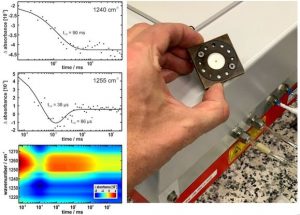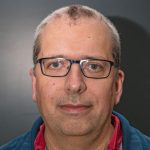 Spectroscopic reaction monitoring is a proven tool in R&D and production environments, where it is used to gain insight into chemical reactions. In this webinar we showcase how dual-comb spectroscopy (DCS) can be used to monitor protein dynamics on a microsecond to millisecond time-scale.
Spectroscopic reaction monitoring is a proven tool in R&D and production environments, where it is used to gain insight into chemical reactions. In this webinar we showcase how dual-comb spectroscopy (DCS) can be used to monitor protein dynamics on a microsecond to millisecond time-scale.
FTIR with time resolutions faster than 10 ms is only possible with photoactivable proteins, where the reactions can be repeated hundreds of times because they undergo a photocycle. Most protein reactions are non-repetitive. In many cases reactions can be induced by caged compounds. As an example, we investigate the inhibiting Gi protein and the larger protein-protein complex of Gai with its cognate regulator of G-protein signaling (RGS). We compare caged-compound induced reactions monitored by FTIR and DCS, respectively. With DCS we observe good data quality with 4 µs time resolution, four orders of magnitude faster than the FTIR measurement. DCS allows for infrared spectroscopic studies in the so far unresolvable µs time regime for non-repetitive biological systems including all GTPases and ATPases.
25 March 2021 – CET
Speakers

Florian Eigenmann
The webinar will be hosted by Florian Eigenmann, he holds a Ph.D. in Chemistry from ETH Zurich and joined IRsweep in 2018 as Head of Sales. He was instrumental in releasing the high spectral resolution version of the IRis-F1 and in developing reaction monitoring applications including stopped flow and curing monitoring. Previously, he was with Bruker Optics and Mettler Toledo for a total of 12 years in Country Manager and Business Development positions for mid-IR applications with a focus on process analytics.

Carsten Kötting
Carsten Kötting obtained a Ph.D. in physical organic chemistry from the Chemistry department of Ruhr-University Bochum, Germany in 1999, working on matrix isolation of carbenes and other organic intermediates. Afterwards he joined the group of nobel laureate Ahmed Zewail at Caltech, where he did femtochemistry of organic intermediates. After two years he returned to Ruhr-University but this time to the department for biology and biotechnology and joined the biophysics institute of Klaus Gerwert. He finished his habilitation in chemical biology in 2009. He is currently working on time resolved FTIR spectroscopy of proteins, with the main focus on GTPases. Within the new center for protein diagnostics (ProDi) he is developing new chemical methods for the immobilization of proteins to extend the applications of vibrational spectroscopy.
